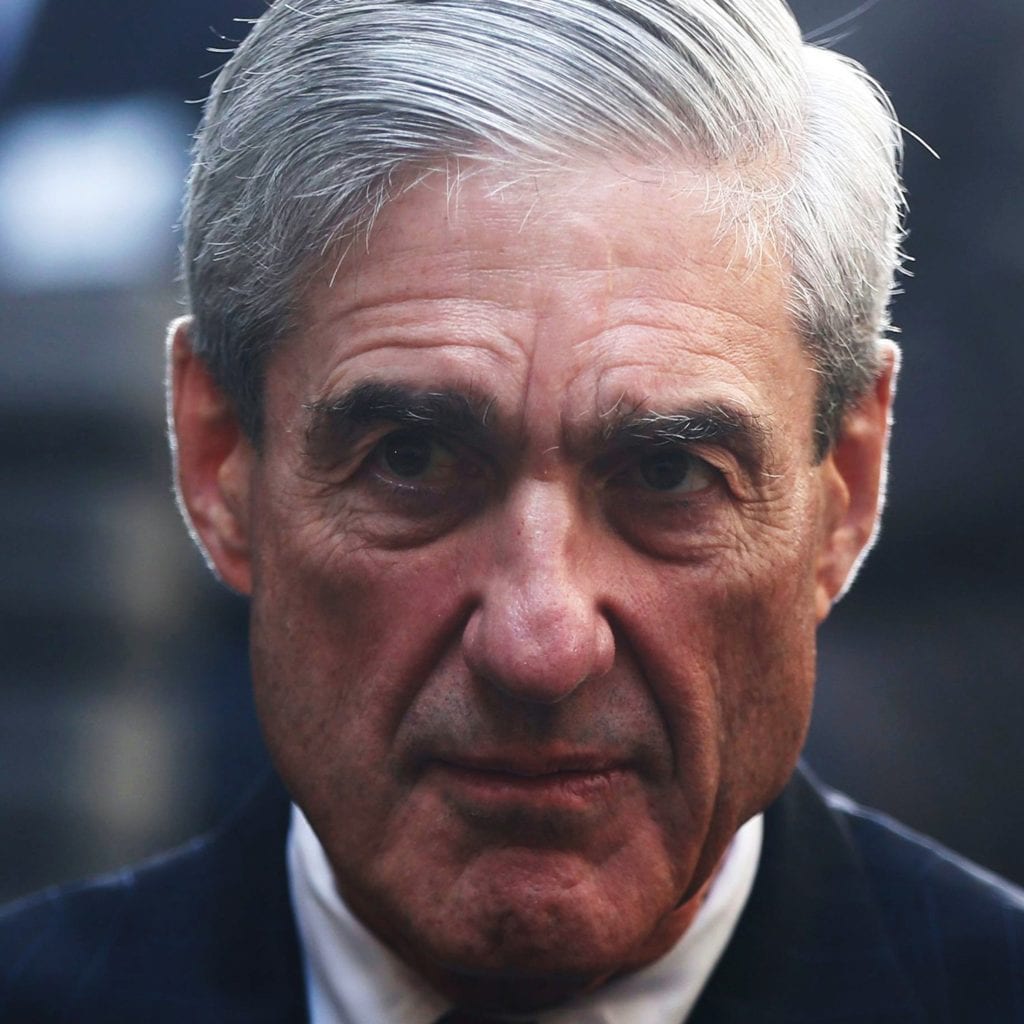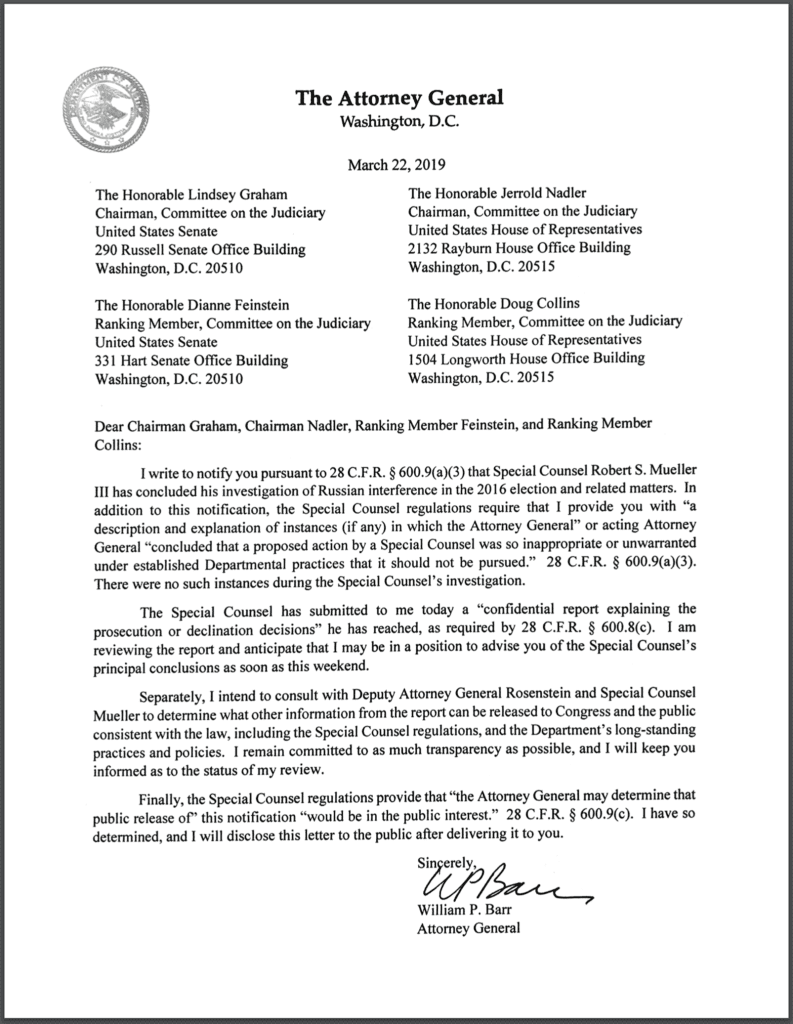By Glynn Wilson –
In typical Washington fashion, word leaked out on Friday afternoon that Department of Justice Special Counsel Robert S. Mueller delivered his final report to Attorney General William P. Barr on the inquiry into Russian interference in the 2016 election. The House Judiciary Committee was notified to expect the report’s delivery Friday afternoon by 5 p.m.
Not since the Watergate scandal in the early 1970s has a special prosecutor’s inquiry into corruption by a president so mesmerized the American public, dominating press coverage and social media engagement on and off for the past two years and casting a pall over President Donald J. Trump since he was sworn in and moved into the White House in early 2017.
“I may be in a position to advise you of the special counsel’s principal conclusions as soon as this weekend,” Barr wrote to House and Senate Judiciary committees leaders in a letter late Friday (see below), reiterating that he remains “committed to as much transparency as possible.”
Per Department of Justice regulations, it is up to the Attorney General how much of the report to share with Congress and the American public.
While the House voted unanimously in March on a non-binding resolution to make the report’s findings public, it remains to be seen what will become of it. And since it was not accompanied by any new indictments, there is no indication of whether there are recommendations about potential obstruction of justice allegations against President Trump himself, even though a slew of campaign officials working for Trump have pleaded guilty to a host of charges and cooperated with the special counsel in what surely involved charges against Mr. Trump, members of his family and staff.
The news was immediately followed by tweets from Trump’s legal team Rudy Giuliani and Jay Sekulow.
“We’re pleased that the Office of Special Counsel has delivered its report to the Attorney General pursuant to the regulations,” they say. “Attorney General Barr will determine the appropriate next steps.”
The White House also responded.
“The next steps are up to Attorney General Barr, and we look forward to the process taking its course,” Press Secretary Sarah Huckabee Sanders tweeted. “The White House has not received or been briefed on the Special Counsel’s report.”
Since Mr. Mueller’s appointment in May 2017, his legal team has been charged with focusing on allegations that Russian operatives sought to interfere in the outcome of the 2016 presidential election, as well as whether anyone in the Trump campaign cooperated. While the inquiry actually began months earlier by the FBI and revealed a clear Russian influence operation, and a half-dozen campaign officials have been sentenced to prison for related charges, mostly violations of campaign finance laws and lying to federal investigators and Congress, the million dollar question is:
Will the report detail allegations against the president himself for knowingly participating in or colluding with Russia to win the election?
There is ample public proof that he did, including his own statements and tweets. His public and secret relationship with Russian dictator Vladimir Putin — including his refusal to reveal the contents of conversations with dictators — raises larger questions about his loyalty to the United States and the Constitution. The report could address whether Trump aided and abetted a foreign enemy of the U.S., which would constitute treason.
Dozens of Russian intelligence officers and oligarchs with ties to Putin have been charged in the case, although those charges are likely to languish in court since the defendants are unlikely to face extradition.
While the delivery of the report brings Mueller’s investigation to a close, and a few members of his team are expected to remain awhile longer to close down the special counsels office, it does not end other investigations Mueller’s office handed off to federal prosecutors in New York, or Congressional investigations still underway. Recently filed court documents show that investigators are still examining why the former Trump campaign chairman Paul Manafort turned over campaign polling data in 2016 to a Russian associate prosecutors said was tied to Russian intelligence.
There is ample evidence that the special counsel looked extensively into whether Trump obstructed justice to protect himself or associates. Yet despite months of negotiations, prosecutors were unable to personally interview the president. Trump’s attorneys fought off such an interview, insisting that he only respond to written questions. While according to Justice Department policy a sitting president cannot be indicted, Trump’s lawyers worried that his responses in an oral interview could bring political repercussions, including impeachment, or put him in legal jeopardy once he’s out of office, likely after losing reelection in 2020.
Five of Trump’s key aids were found guilty or pleaded guilty for deceiving federal investigators or Congress about their interactions with Russians during the campaign or the transition into the White House, including campaign manager Paul Manafort, Michael T. Flynn, the president’s first national security adviser, Michael D. Cohen, Trump’s former lawyer and longtime fixer. Roger J. Stone, Jr, a sixth adviser, is to stand trial in November on charges of lying to Congress about working with the Russians to leak Democratic Party emails to Wikileaks.
The regulations that govern special counsels under the supervision of the Justice Department only require him to explain his decisions to either seek or decline to bring criminal charges in a confidential report to the attorney general, who is then required to notify the leadership of the House and Senate judiciary committees and decide what further charges, if any, to bring — against the president, his family or staff.
Barr promised during his Senate confirmation hearing to release as much information as possible, saying “the country needs a credible resolution of these issues.”
“But he may be reluctant to release the part of Mr. Mueller’s report that may be of most interest,” according to the New York Times, “who the special counsel declined to prosecute and why, especially if Mr. Trump is on that list.”
Another question is whether the public’s right to know is more important than DOJ policy. If the special counsel declined to pursue criminal charges against the president because of policy, not for lack of evidence, what would the Attorney General do in that case? Will he be governed by the public interest or the argument that bringing charges against the president would hinder his ability to lead the country?
Behind the scenes, according to the Times and other reports, White House lawyers are preparing for the possibility they may need to argue some material is protected by executive privilege, especially if the report discusses whether the president’s interactions with his top aides or legal advisers are evidence of obstruction of justice.
House Judiciary Committee Chairman Jerrold Nadler, a Democrat from New York, has argued the department’s view that presidents are protected from prosecution makes it all the more important for the public to see the report.
“To maintain that a sitting president cannot be indicted, and then to withhold evidence of wrongdoing from Congress because the president cannot be charged, is to convert D.O.J. policy into the means for a cover-up,” Nadler said before the House approved its non-binding resolution to disclose the special counsel’s findings.
Any disclosures from the report may not satisfy either Trump’s critics or defenders, since the expectations are so high and so much is at stake. Polls show Republicans support the president and don’t believe charges even already proved in court, while Democrats believe there is ample evidence to indict Trump, impeach him, and remove him from office immediately.
House Speaker Nancy Pelosi and Senate Minority Leader Chuck Schumer called for special counsel Robert Mueller’s report to be released to Congress and the public in its entirety — and warned against allowing the report to be shown to the White House first or allowing President Trump to interfere in the decision-making behind what gets released.
“Now that Special Counsel Mueller has submitted his report to the Attorney General, it is imperative for Mr. Barr to make the full report public and provide its underlying documentation and findings to Congress,” the joint statement read. “Attorney General Barr must not give President Trump, his lawyers, or his staff any ‘sneak preview’ of Special Counsel Mueller’s findings or evidence, and the White House must not be allowed to interfere in decisions about what parts of those findings or evidence are made public.”
The Letter















